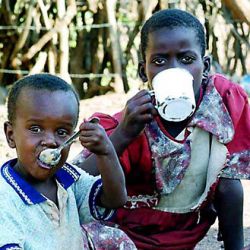Peter Munabi, 52, who is HIV positive, lives in Kibera, the largest informal settlement in the Kenyan capital, Nairobi. He told IRIN/PlusNews that feeding his family depended almost entirely on luck. "My wife died from HIV-related complications in 1999. I got tested the following year and was found positive. I am on ARVs [antiretrovirals] now, and I am also on medication for TB [tuberculosis].
"My wife and I had five children, but two died from this disease. I now live with the remaining three children and five other children who belong to my late brothers and other relatives. "One of my kids, the middle one – a girl aged 16 – has a very bad chest and her body is weak; I think she may be positive … I need to bring her for a test.
"Before my wife died, I was a shop assistant in town but since then, because of the kids and the illness, I have been unemployed, just working when I can find odd jobs. "I live in a one-room house with all the kids and pay 1,500 shillings [US$20] per month. I must admit that since last year’s post-election violence [in 2008], when my landlord was chased away from the neighbourhood, I have not paid any rent. Unfortunately, he’s back now and demanding money – I don’t know where I’ll get it.
"The biggest issue we have now is food; occasionally the Kibera district [local government] headquarters gives us some food, but since the recent food shortages, it is hard to get food there because everyone in the neighbourhood is short of food. Even today I came with a paper bag, hoping there might be some, but it’s all gone.
"I live like a bird, eating food whenever I can find it. The ARVs make me so hungry – if I don’t have food then I just sit at home, shaky with weakness."
For information, please see: http://www.plusnews.org





